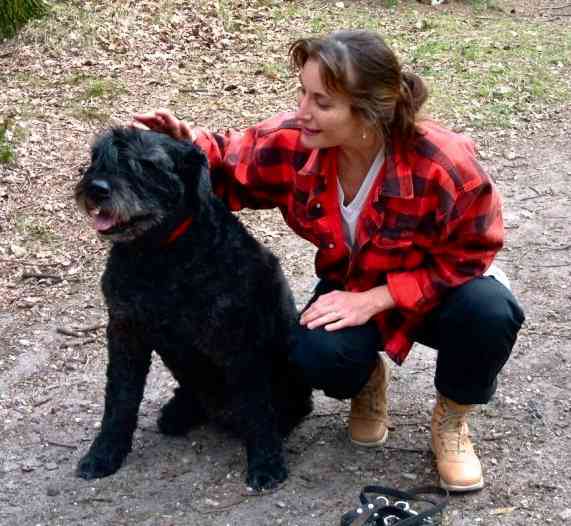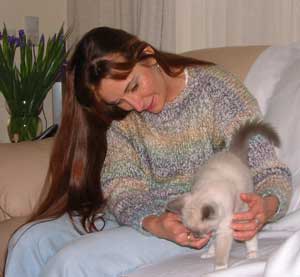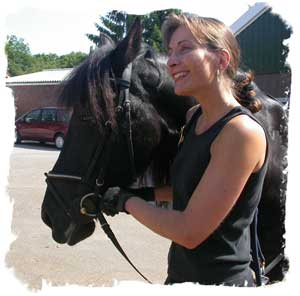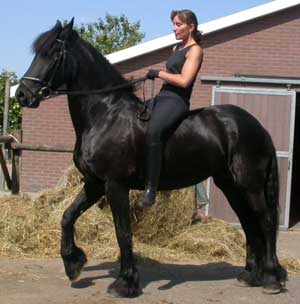Meira van der Spa
 My Hebrew name, pronounced "may-eera,"
actually means (or so I have been told by a friendly Jewish lady)
"bringer of light." In Latin, however, when the two
syllables are separated, it would mean "my fury." Both
meanings are equally applicable since my sunny disposition may
indeed shed light on the lives of those I love, while my stubbornness,
ceaseless questioning, curiosity and rebellious nature at times
may cause exasperation. The two extremes of the meaning of my
name, however, perfectly express the extremes of my character.
So the name, although practically unpronounceable, suits me like
no other would.
My Hebrew name, pronounced "may-eera,"
actually means (or so I have been told by a friendly Jewish lady)
"bringer of light." In Latin, however, when the two
syllables are separated, it would mean "my fury." Both
meanings are equally applicable since my sunny disposition may
indeed shed light on the lives of those I love, while my stubbornness,
ceaseless questioning, curiosity and rebellious nature at times
may cause exasperation. The two extremes of the meaning of my
name, however, perfectly express the extremes of my character.
So the name, although practically unpronounceable, suits me like
no other would.
Like my name, my life has hitherto known many extremes, both at a personal and at a professional level. The child of expatriates living and working in several developing countries, I had seen a great deal of the world at a relatively young age. The fact that we moved from place to place obviously affected my schooling. Despite the obvious practical implications, I managed to successfully complete both my O-levels and International Baccalaureate, inclining toward the arts and languages. At age 18, I moved to The Netherlands, where I enrolled at and studied Languages, majoring in Latin-American Studies. After obtaining my university degree at Utrecht University, I proceeded to obtain a Journalism degree at the .
"I have never let my schooling interfere with my education." (Mark Twain)
 After completing these various
degrees, it was time for some education. I deliberately moved
away form the relatively protective university environment and
into the "real world" to discover, with a shock, that
all of my schooling had left me ill-prepared for the challenges
of daily life as well as robbed me of much of the self-confidence
I had as a child.
After completing these various
degrees, it was time for some education. I deliberately moved
away form the relatively protective university environment and
into the "real world" to discover, with a shock, that
all of my schooling had left me ill-prepared for the challenges
of daily life as well as robbed me of much of the self-confidence
I had as a child.
I fell deeply in love, and joined the object of my passion (now my husband) in working in his Gym. The years that followed, in which I became co-owner of a sports centre, taught me a great deal. They have taught me self-confidence, self-esteem, humility, pragmatism, the meaning of the word "sacrifice," the value of true love, but also, they have revealed to me my passion for teaching. Teaching in the purest sense of the word: a continuous interaction between people, learning with and from each other, critically appreciating each other's performance and motivating each other. I teach several disciplines of aerobics and fitness, but see myself more as a motivator than as a teacher. It is my firm belief that once we perceive of ourselves from the perspective of our possibilities rather than from the perspective of our limitations, our opportunities are virtually limitless.
At present, I still teach various disciplines of sports. In addition, I work full-time as Communications Officer at . Besides I serve, in my spare time and on a voluntary basis (like all learndev-ers), also as Communications Officer for LDI.
 In my spare time I draw, write
and, with my husband, enjoy our and my beautiful Nynke, with whom I practice . Classical dressage, because I believe that through
the patience and intelligence of animals, man is humbled. And
training a horse is, in my view, an honour that requires humility.
It is only through humility and unconditional love that a rider
may hope to reach a complete and total collaboration with his
of her mount, so that riding becomes a pleasurable and liberating
experience for both the horse and the rider.
In my spare time I draw, write
and, with my husband, enjoy our and my beautiful Nynke, with whom I practice . Classical dressage, because I believe that through
the patience and intelligence of animals, man is humbled. And
training a horse is, in my view, an honour that requires humility.
It is only through humility and unconditional love that a rider
may hope to reach a complete and total collaboration with his
of her mount, so that riding becomes a pleasurable and liberating
experience for both the horse and the rider.
 In addition: I am Internet enthusiast,
spending quite some time on newsgroups and platforms. Through
my personal
experience with schooling and education, I have always had
a keen interest in lifelong learning and informal education.
From this perspective I have followed the work of LDI, to which
I have contributed in the ongoing research in the field of The Scientific Mind, investigating
the Internet
and electronic media as a feeding ground for the development
of the scientific mind. While not building on extensive research
experience or thorough familiarity with research methodology
as an academic field, I do not believe my lack of experience
to be a handicap. After all, it was one of the greatest minds
of our time, Albert Einstein, who said: "If we knew what
it was we were doing, it would not be called research, would
it?"
In addition: I am Internet enthusiast,
spending quite some time on newsgroups and platforms. Through
my personal
experience with schooling and education, I have always had
a keen interest in lifelong learning and informal education.
From this perspective I have followed the work of LDI, to which
I have contributed in the ongoing research in the field of The Scientific Mind, investigating
the Internet
and electronic media as a feeding ground for the development
of the scientific mind. While not building on extensive research
experience or thorough familiarity with research methodology
as an academic field, I do not believe my lack of experience
to be a handicap. After all, it was one of the greatest minds
of our time, Albert Einstein, who said: "If we knew what
it was we were doing, it would not be called research, would
it?"
For those interested, here is my resume. I can be reached at [email protected].